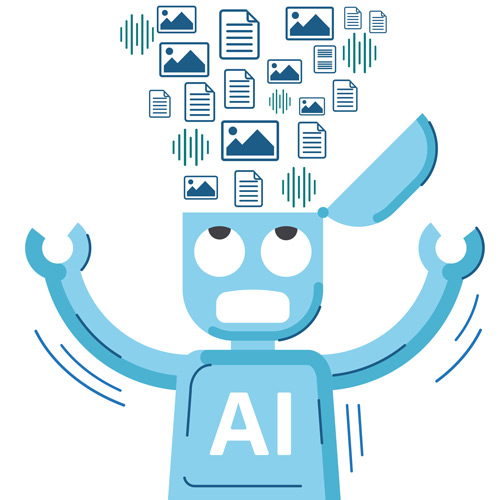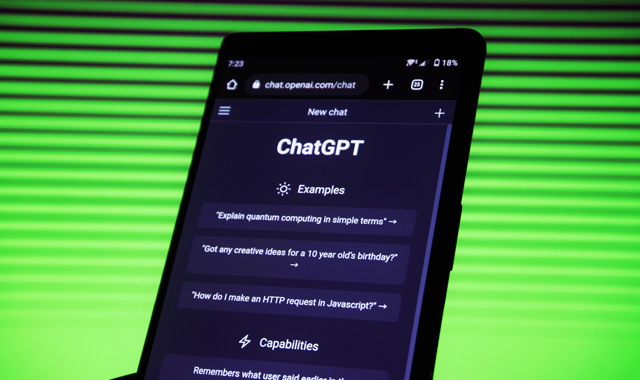Getting started is considered one of the most challenging aspects of writing.
As a writer, you’ll agree that this is true, and is closely rivaled by generating ideas and crafting a beautifully flowing piece.
Have you ever wondered what it would be like to have a tool that could help you craft amazing pieces of copy for your blog, website, or clients? Well, with the advent of artificial intelligence (AI) and its application in writing, this dream has become a reality.
One of the AI tools that has taken the world by storm is ChatGPT.
This artificial intelligence application uses natural language processing to generate human-like written content such as copywriting articles.
It writes content quickly and efficiently, making it easier than ever to get your message across to your audience.
Writers across the globe are embracing ChatGPT for its ability to enhance productivity and boost creativity.
You probably have questions about this AI tool and its potential to impact your copywriting or blogging career. We’ve got you covered with this guide.
As we go into depth about ChatGPT, you’ll discover:
- How exactly ChatGPT works
- The benefits of incorporating ChatGPT into your writing process
- Common concerns about using AI for writing
- Tips for getting the best out of this tool
- How to upgrade your skills for using AI to generate written content
Let’s take a look at ChatGPT and why you should use it to improve your writing process.
Understanding the Intersection of AI and Writing

The secret of change is to focus all your energy not on fighting the old but on building the new.
Socrates
When we think of AI, we often imagine robots or other automated machines performing complex tasks such as coding. However, AI has stepped in to help us with writing.
In particular, ChatGPT is a powerful tool that combines natural language processing (NLP) and machine learning (ML) algorithms to create engaging written content.
With this technology, it’s become incredibly convenient for writers to generate compelling content quickly and efficiently. Gone are the days of spending hours brainstorming ideas and writing each sentence manually.
Beyond ChatGPT’s practical applications for writers, it raises important questions about the limitations of AI, and the ethical issues surrounding its use in content creation.
Understanding the implications of using such powerful technologies before implementing them into our everyday workflows is important.
ChatGPT is an example of how far AI has come in recent years—from playing games like chess to creating sophisticated chatbot systems that interact with humans naturally.
For writers who need assistance but lack the time or resources to do everything manually, this advancement in technology opens up new possibilities for efficiency.
However, remember that there are still some limitations when it comes to AI. For example, it cannot yet think critically on its own or make moral decisions based on complex scenarios.
With advancements like ChatGPT bringing us closer than ever before to human-like conversation and artificial intelligence capabilities, we must remain mindful of the potential risks associated with relying too heavily on such tools when crafting written content for consumption by others.
While useful tools like these should not be discounted altogether due to their convenience and speed, it’s crucial that any content created using them be thoroughly evaluated by human eyes first.
The human oversight is still important to ensure quality assurance and accuracy before publishing or releasing such content to the public.
The Emergence of ChatGPT: A Game-Changer in AI Writing
ChatGPT is revolutionizing the way we approach AI writing, introducing a new level of creativity and complexity.
We’re living in exciting times for writers, and as the technology continues to evolve, things will only get more interesting.
This tool is so popular that according to a UBS report, ChatGPT reached its first 1 million user milestone in just a week!
This technology has allowed for much more efficient, accurate, and innovative systems for creating content. It not only saves time but also enhances grammar and syntax accuracy. It allows for improved accuracy in terms of grammar and syntax.
At the same time, the ethical implications of ChatGPT raise questions about how best to use this tool.
While it can be used for beneficial purposes such as creating high-quality content with minimal effort, there’s always a risk of misuse leading to potentially dangerous consequences.
For example, if a writer uses ChatGPT to create malicious or biased content, this creates opportunities for serious ethical and legal consequences.
Therefore, any use of this technology must be carefully monitored by experts in order to ensure its use remains within acceptable boundaries.
ChatGPT has certainly changed the game when it comes to AI writing, allowing us to create complex pieces of work quickly while maintaining accuracy and quality standards.
However, we must remember that with great power comes great responsibility. Using this technology responsibly will ensure that we realize its full potential without any negative effects on society or individuals.
Warning: Remember, relying too heavily on AI can stifle personal creativity. Balance is key.
How ChatGPT Works: A Simplified Overview

Whether you’re new to ChatGPT or you’ve dabbled in it for a while, you might be wondering how exactly it works.
Giving it prompts and receiving detailed answers in return seems like magic.
However, no spells are involved in the process. ChatGPT isn’t self-driven either—AI is yet to reach that point.
So what goes into making this powerful technology work? Let’s take a closer look.
Using AI
ChatGPT uses artificial intelligence (AI) algorithms to generate data-driven content that’s tailored to your needs.
As you feed ChatGPT with prompts, it analyzes the data and recognizes patterns to create relevant responses.
All this is possible because according to OpenAI, the creators of this technology, ChatGPT-3 was trained on over 45 terabytes of data collected from books, academic papers, and the entirety of Wikipedia at its conception.
Automation
Once the AI has identified patterns, it automatically generates text. This allows you to quickly produce high-quality output without having to manually write line by line.
Automation is cost-cutting by tightening the corners and not cutting them.
Haresh Sippy, Entrepreneur and Technocrat
Natural Language
By using natural language processing (NLP), ChatGPT understands the context and meaning behind different words or phrases used in writing.
NLP helps the AI to generate accurate results that are tailored toward specific audiences or topics.
Text Generation
With the help of NLP, ChatGPT generates text based on your input such as keywords, phrases, or topics.
Apart from creating original pieces from scratch, this tool is also useful for summarizing existing articles with minimal effort from the user.
Machine Learning
Finally, by leveraging machine learning techniques, ChatGPT is able to learn from past experiences and continually improve its performance over time. This ensures that you’ll always get the best possible results when using this technology for your projects.
ChatGPT offers an unprecedented level of automation for any type of written work—from basic blog posts all the way up to complex research papers.
Anyone looking to improve their writing productivity levels without sacrificing quality would be remiss to avoid using this technology.
Whether you’re a professional blogger looking for assistance with your daily workload or an upcoming copywriter needing some extra help with creating high-quality articles for your clients, ChatGPT is an invaluable tool to add to your arsenal.
The Potential of AI in Copywriting and Blogging

With AI technology, the heights that copywriting and blogging can reach are almost endless.
Natural language processing enables AI to write stories as if by a human author, with algorithms that understand the context of conversations or narratives.
Writing assistance is also readily available, allowing writers to focus on the creative aspects of their work while relying on AI-generated content to fill in the rest.
Various fields have been using AI for a long time, but it’s only recently become an integral part of content creation. It provides accurate information faster than ever before, making it easier for writers to find inspiration when creating copy or blog posts.
As a writer, you understand how mentally involving the writing process is. Having a tool that eases the demand on your mind is such a game-changer for your workflow, making writing fun again.
AI’s ability to understand complex topics makes it ideal for generating compelling stories that readers will want to engage with.
Its automated nature reduces manual labor and saves time since most tasks are completed without any input from a human writer.
By using artificial intelligence in combination with natural language processing, authors are able to produce better quality work with fewer errors compared to traditional copywriting methods.
This not only boosts productivity but also allows for much more targeted content that appeals directly to an audience’s preferences and interests.
With AI-powered tools like ChatGPT, bloggers no longer have to worry about struggling through endless drafts before getting something they’re satisfied with publishing online.
The possibilities provided by AI are vast. From helping authors craft perfect headlines or body paragraphs that match their desired tone of voice all the way up to generating entire articles based on keywords provided by readers, the only limitation to AI writing is the user’s creativity.
This makes it one of the most powerful tools for modern-day writers who want their work read by as wide an audience as possible while staying true to their own style.
Content created this way offers countless advantages over traditional methods such as:
- Improved accuracy
- Speedier production times
- Greater insight into what resonates best with an audience
Using AI for writing is one fantastic and easy way to achieve increased success in your copywriting or blogging career.
Did You Know? OpenAI’s GPT-3 model has 175 billion machine learning parameters, making it one of the most powerful language models to date.
Demystifying ChatGPT: Inputs, Outputs, and Everything in Between

As amazing as ChatGPT is, you need to keep in mind that it’s just a tool. It’s not meant to completely eliminate your creative effort as a writer, and neither is it infallible.
This AI generative application has a number of limitations that you need to be aware of. Some of them include:
- Limited knowledge: This AI model can’t access information about new technology and products that have emerged in the past few years.
- Incorrect information: ChatGPT sometimes makes factual errors but presents the answers in a way that appears convincing.
- Excessive repetition: A good chunk of ChatGPT’s writing is repetitive and comes across as robotic.
- It’s not a search engine: This tool can’t provide real-time information since it has no access to the internet.
Given these challenges, it’s important to always fact-check ChatGPT’s responses to ensure you don’t mislead your readers.
On the flip side, ChatGPT provides users with a host of features designed to make sure they get the most out of their experience while remaining within ethical boundaries.
From detailed analytics to customizable settings for different types of projects, ChatGPT empowers users to control how they choose to use AI in their workflows.
It also offers several security measures so that users can be confident their data is completely safe from malicious attacks or unauthorized access.
Here are some of the measures employed by OpenAI to protect your data:
- Encryption: ChatGPT servers use encryption to safeguard users’ data.
- Incident response plans: OpenAI has incident response plans in place to manage any breaches in security in case they happen.
- Access controls: OpenAI ensures that only authorized personnel have access to sensitive user data.
- Security audits: An external third party audits the company annually to address potential vulnerabilities in the technology.
ChatGPT makes creating compelling content easier than ever before without sacrificing creativity or quality standards—all while being aware of its ethical implications when used responsibly.
With its intuitive interface and robust feature set, you’re firmly on course to fully unlocking your potential as a writer. Your pieces will be effective, engaging, and a hit with your audience.
Advantages of Integrating ChatGPT Into Your Writing Process

Integrating ChatGPT into your writing workflow enables you to optimize your process and the content you produce.
Here’s how this technology elevates your creative endeavors:
1 – Improved Content Quality
With ChatGPT, your texts become more natural-sounding and easier to read. The AI recognizes the nuances of language and automatically generates realistic-sounding sentences in response to your input.
This allows for accurate representation of ideas without sacrificing quality or accuracy.
2 – Time Management
Using ChatGPT eliminates the need for manually researching topics or coming up with ideas. As a result, it saves valuable time by reducing redundant tasks that you would otherwise have to do yourself.
Furthermore, it helps streamline processes related to copywriting such as creating outlines or generating drafts quickly with minimal effort required from you.
3 – Cost Effectiveness
Integrating ChatGPT into your writing process is cost-effective because it reduces human labor costs associated with traditional approaches to writing such as manual research or editing.
By incorporating ChatGPT into your writing process, you’ll gain access to a wide range of benefits to help improve productivity and boost creativity in all aspects of your content creation.
There’s no easier way to ensure that every word counts!
Addressing Common Concerns About AI Writing Tools
Despite the potential benefits of AI writing tools such as ChatGPT, there are some common concerns about using these solutions.
One of the main worries is around AI accuracy. Will an AI-generated piece of content actually make sense?
We know how powerful natural language processing (NLP) is when it comes to content generation, but do the machines get it right every time?
As we saw earlier, proofreading and fact-checking the responses given by ChatGPT is essential to end up with factual, and sensible information.
In addition, how well this particular NLP engine understands our written language is a difficult question to answer without putting ChatGPT through rigorous testing and analysis.
Fortunately, many chatbot companies have done just this and consistently found positive results in terms of accuracy and readability.
Privacy implications are another worry. What data will these tools collect and who has access to it?
And although we may not be talking about a humanoid robot, ethical considerations still come into play when discussing AI writing tools.
It’s important that those responsible for using or developing any kind of AI solution understand the potential risks associated with the technology they’re working with.
Companies like OpenAI have invested heavily in ensuring that their tools are secure and compliant with regulations such as General Data Protection Regulation (GDPR).
They prioritize customer privacy by only collecting essential data that’s required for their services.
ChatGPT is by no means a perfect solution but its strengths far outweigh its weaknesses. The intuitive user interface makes it easy even for beginners to create quality content quickly without having to spend hours on research or idea generation.
Furthermore, its advanced security features make ChatGPT one of the safest ways to generate automated content online today.
All things considered, it’s safe to say that integrating ChatGPT into your writing process could be hugely beneficial, both from a productivity standpoint and from an overall cost perspective.
Why This Matters: The concerns surrounding AI writing tools are valid, but with advancing technology, increased transparency, and robust regulations, we’re moving towards more reliable, secure, and efficient AI-powered content generation.
Taking the Next Steps: How to Start Your Journey With ChatGPT
The future belongs to those who learn more skills and combine them in creative ways.
Robert Greene
ChatGPT is a fast-tracking solution that offers key benefits like data analysis and automation strategies. It gives you the creative possibilities you need to take your writing projects to the next level.
The table below provides a detailed overview of ChatGPT’s key benefits, their practical use cases, and the expected positive outcomes.
| Benefit | Use Cases | Outcome |
| Automation strategies | Writing articles, blogs, stories, scripts, and poems | Increase efficiency & productivity in writing projects |
| Data analysis | Analyzing sentiment & tone of text content; identifying grammar & syntax mistakes; comparing content variations for quality improvement | Enhanced accuracy in written content & improved quality of outputs |
| Creative possibilities | Generating ideas for writing projects quickly; creating unique storylines or narratives; brainstorming different themes or topics quickly | More variety of outputs with innovative ideas and concepts |
This incredible tool will help you save time while giving you the flexibility to focus on more complex writing challenges instead of mundane tasks like rewriting paragraphs or summarizing documents.
To get the most out of this revolutionary large language model, consider employing the following strategies.
Ask It to Add More Information
You don’t have to go with the first response that the chatbot gives you.
Asking for more details on a prompt provides deeper insights on specific points, making the reading experience more engaging than an article with no depth.
Use Clear and Concise Requests
When asking for information on a topic, be as specific as possible. The more data you feed the chatbot, the better the responses you’ll get.
Using keywords is also fantastic for helping ChatGPT generate accurate and relevant responses.
Ask ChatGPT to Rewrite the Responses
If the response you get doesn’t float your boat, no worries. Simply ask ChatGPT to rephrase the answer.
You could tell it to use a different tone, add examples, reduce the word count, or meet other requirements to produce a satisfactory answer.
Break Down Your Content
ChatGPT really shines when it comes to generating outlines, but not so much for entire articles.
You’ll get much better results by breaking down your content into subheadings and using these to ask the chatbot questions.
With the right subheadings, you’ll have relevant content to weave into an article within minutes.
Whether it’s an article, a blog post, or an engaging story for your client, don’t let manual labor slow down your progress anymore. Let ChatGPT do all the hard work so that you’re free to focus on the fun part of the creative process.
ChatGPT: An Essential Tool for Forward-Thinking Writers

The best way to predict the future is to invent it.
Alan Kay
From the moment AI large language models were released to the public, there was much concern about whether writers were doomed to oblivion.
However, smart writers realize that these AI writing tools are just that—tools. They harness the power of technology to streamline their copywriting and blogging processes.
They’re aware of the advantages and even some of the common concerns associated with AI writing tools such as ChatGPT.
If you’d like to join the league of forward-thinking writers in using ChatGPT to level up your writing career, consider taking our AI Empowered course.
The in-depth lessons will help you discover how to harness the potential of AI to enhance your copywriting skills, give your blog a new lease of life, and gain an edge over the competition in the saturated online writing space.

